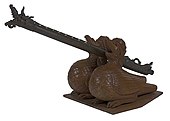Salukat
| Salukat | |
|---|---|
 A Salukat, pre-1883. | |
| Type | Quiver |
| Place of origin | Indonesia (Mentawai Islands) |
| Service history | |
| Used by | Mentawai people, Sakuddei |
Salukat or Saloekat is a traditional quiver of the Mentawai people originating from the Mentawai Islands, Indonesia.
Description
The Salukat is a quiver made of a long segment of bamboo with a partition at the lower part and a long sharp protrusion at the tip.[1] The arrow used are not fletched. In some cases the nock was provided by whipping two slivers of wood on opposite sides of the tail end of the shaft in such a way that they projected a short distance beyond it. The Mentawai people generally put poison on the tips of their arrows, using a mixture of omai (Antiaris toxicaria), lombok (Capsicum annisum), tuba (Derris elliptica) and baglai (Alpinia galanga). The arrow is known as logui and the anterior section of the foreshaft alone as bakulu.[2]
See also
References
- ^ Albert G Van Zonneveld (2002). Traditional Weapons of the Indonesian Archipelago. Koninklyk Instituut Voor Taal Land. ISBN 90-5450-004-2.
- ^ Russell Jones (1959). Journal of The Malayan Branch Royal Asiatic Society. Royal Asiatic Society, Singapore. ASIN B00ATRX786.
External links
 Media related to Salukat at Wikimedia Commons
Media related to Salukat at Wikimedia Commons



